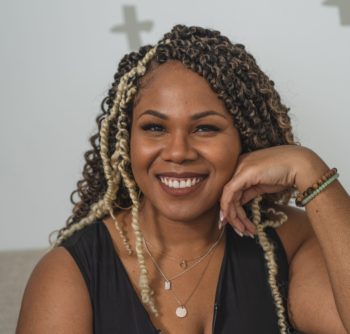
Responding to Mental Health Crises : The Value of Peer Support in the ACB Community – An analysis
By Tatanisha Riggan, BSc, RSSW
The Ottawa Community Partnerships for Health Equity (OCPHE) recently hosted their seventh segment of the webinar series Responding to Mental Health Crises to learn about the Recovery Connections program, an essential peer-led initiative run by Psychiatric Survivors of Ottawa.
Amy Klassen, guest speaker and Program Manager of Recovery Connection, emphasized the benefits of intentional-style peer support and the value of being open about one’s recovery journey in mental health with others.
“[W]e introduce the concepts of recovery and peer support, and then we hold on-going space for them to interact. Within that framework, we can help many people get connected,” says Klassen. With the help of dedicated peer support workers and volunteers, the Recovery Connections program offers intentional-style peer and family support for individuals in in-patient mental health units, emergency departments, addiction treatment centres and supportive housing programs.
At its core, peer support is a supportive relationship between people who have lived experiences in common. Since 2010, the Mental Health Commission of Canada has highlighted peer support as a valuable component of the recovery journey for individuals with mental health challenges and their family members/loved ones. Fundamental to this framework, peer support workers bring value through their lived experience with mental health challenges or as a family member or loved one of someone who does. Psychiatric Survivors of Ottawa provides in-house training to all staff and volunteers on intentional style care support and peer facilitation as well as Applied Suicide Intervention Skills Training (ASIST), Motivational Interviewing and Cognitive Behavioural Therapy training, when suitable.
As with every webinar in this series, the Q & A segment launches with two initial questions: 1) How has this service delivery model been culturally adapted? and 2) Have you tried to incorporate culturally informed responses to better serve black and indigenous peoples?
Klassen replied that the PSO team regularly engages in training held by several Ottawa community organizations, such as indigenous cultural safety training, so they can more adequately “meet people where they are at.” Moving forward, PSO hopes to make more connections with various community organizations and lodges, mainly when job postings are available to become more representative of the people they serve.
Thanks to the contribution of Black-led health initiatives and organizations such as the FAMHAS Foundation and Black Health Alliance, we have more significant insights into the ways mental health affects Black Canadians. For example, according to findings from a 2018 survey of 328 Black Canadian residents, 60% said they would be more willing to use mental health services if the mental health professional were Black. In the same way, between 2001 and 2014, 38.3% of Black Canadian residents with poor or fair self-reported mental health used mental health services, compared with 50.8% White Canadian residents.
In an effort to address the growing mental health needs of the Ottawa Black community, Mood Disorders Ottawa (MDO) in collaboration with the Ottawa Black Mental Health Coalition (OBMHC), has formed and launched an African Caribbean Black Peer Support Group for individuals who struggle with mental health issues.
MDO is a registered nonprofit, volunteer-run organization that supports people with mood disorders and other mental health issues. Peers will meet virtually every Tuesday between 1:00-3:00 pm to share their experiences, struggles and challenges with one another. The group is facilitated by trained peer support facilitators from the ACB community. Register at www.mooddisordersottawa.ca to learn more.
We all have a part to play in de-stigmatizing help-seeking to build healthier Black communities. Whether that’s seeking out mental health support programs, such as Recovery Connections or MDO, volunteering your time or sharing your lived experience with others. In many ways, peer support models exemplify the Bantu philosophy of Ubuntu, “humanity towards others”. Undeniably, with COVID 19, more Black Canadians recognize that seeking support is not just for those with a mental illness but also an essential part of maintaining good overall health. Still, it is imperative to include feedback from multiple Black representatives when developing mental health programs and initiatives to adequately advocate for the community’s diverse needs.
Responding to Mental Health Crises: Learning What Works in Ottawa and Beyond was co-sponsored by the Social Planning Council of Ottawa, Minwaashin Lodge, Crime Prevention Ottawa, Ottawa Black Mental Health Coalition and Ottawa Community Partnerships for Health Equity.
If you’re interested in learning more, visit www.ocphe.ca/webinars to find previous recordings online.
Sources:
Shining a Light on Mental Health in Black Communities, Mental Health Commission of Canada.(2020).| Retrieved from: https://www.mentalhealthcommission.ca/wp-content/uploads/drupal/2021-02/covid_19_tip_sheet%20_health_in_black_communities_eng.pdf
Sunderland, Kim, Mishkin, Wendy, Peer Leadership Group, Mental Health Commission of Canada. (2013).
Guidelines for the Practice and Training of Peer Support. Calgary, AB: Mental Health Commission of Canada.| Retrieved from: http://www.mentalhealthcommission.com
Williams, Hlumelo Siphe,What is the Spirit of Ubuntu? How can we have It in our lives?.(2018). | Retrieved from: https://www.globalcitizen.org/en/content/ubuntu-south-africa-together-nelson-mandela/
Tatanisha Riggan (she/her) is a Registered Social Service Worker of Jamaican heritage. She received her Bachelor’s dgree in Science and Psychology from the University of Ottawa. As a lifelong learner, she enjoys exploring many topics, including dating and relationships science, mental health and wellness, and economic development within marginalized communities. Tatanisha finds joy in outdoor sports, mindfulness meditation, and quality time with loved ones.

